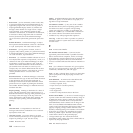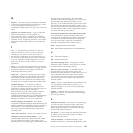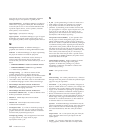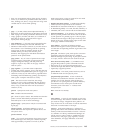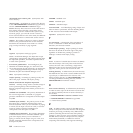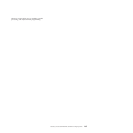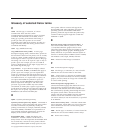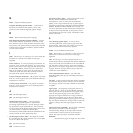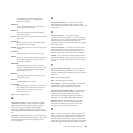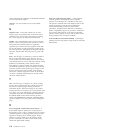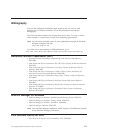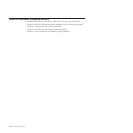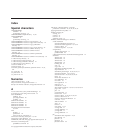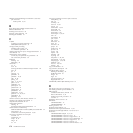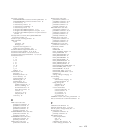G
GHO. Graphics Handling Option.
Graphics Handling Option (GHO). A collection of
hardware and software that enables a Xerox LPS
printer to print encoded, digitized graphic images.
H
HFDL. Host Forms Description Language.
Host Forms Description Language (HFDL). A Xerox
host-resident software product (on z/OS and z/VM)
that customers use to create electronic forms for Xerox
LPS printers. The printer software (microcode) included
with the Xerox LPS printer includes a printer-resident
version of the software.
I
IMG. The file type, or extension, of a Xerox image file.
InfoPrint XT converts Xerox IMGs to AFP page
segments.
inline resources. In a Xerox printing environment, all
resources, such as fonts and graphics, are on the Xerox
printer. Xerox printers can accept jobs that specify FILE
or GRAPHICS DJDEs, which cause new resources to
load on the printer. In some cases, the incoming job
contains no print data, but rather contains resources
that load on the printer when the job runs.
inverse landscape orientation. The position of printed
data on a sheet of paper, 180° from standard landscape
orientation for a device.
inverse portrait orientation. The position of printed
data on a sheet of paper, 180° from standard portrait
orientation for a device.
J
JDE. Job Descriptor Entry.
JDL. Job Description Library.
Job Descriptor Entry (JDE). A set of print-job
characteristics grouped together to represent the
processing requirements for a specific print job. These
are also known as job command sets. You can define
one of the JDEs as the default job descriptor entry. You
can then use this to establish a default print
environment, which DJDE statements embedded in the
actual print job can then dynamically alter.
Job Descriptor Library (JDL). The object file created
by compiling the JSL, which contains one or more JDEs
to use on a Xerox LPS printer.
JSL. Job Source Library.
Job Source Library (JSL). A Xerox LPS printer source
file that contains statements that define the
characteristics of one or more print environments
(JDEs), such as tape formats for tape to print, logical
processing requirements, and output formats (COPIES,
OFFSET, DUPLEX, SHIFT, FORMS, and so forth). To
run Xerox print jobs, the JSL must first be translated to
an object form (compiled) JDL by the printer control
unit. InfoPrint XT does not use JSL commands in data
stream conversion.
L
Laser Printing System (LPS). A class of Xerox
cut-sheet production printers that accept LCDS and
metacode jobs. Most of the LPS printers, such as the
4635, are in the DocuPrint series of printers.
LCDS. Line Conditioned Data Stream.
LGO. The file type, or extension, of a Xerox logo file.
InfoPrint XT converts Xerox LGOs to AFP page
segments.
LIB. The file type of a Xerox 80-byte text file, or a
cluster library file (not in 80-byte text format). InfoPrint
XT processes and uses information in the CLUSTR.LIB
file. This file correlates clusters, which are individual
paper drawers or groups of paper drawers, with names
of paper drawers or paper drawer groups. STK files
contain the name definitions.
Line Conditioned Data Stream. Line data with
embedded DJDEs that specify formatting instructions
for the data.
line data. A data stream format that contains standard
text data and impact printer controls, such as channels
and carriage controls. Line data contains no metacodes
or DJDEs.
logical page. An imaginary rectangular section of a
physical side of a sheet. Using the BEGIN command,
Xerox print jobs can specify that several logical pages
exist on each physical page. Xerox data streams
typically use skip-to-channel-one carriage controls to
jump from one logical page to the next. When data
processing finishes for all the logical pages on one side,
the next skip-to-channel-one carriage control causes the
printer to jump to the first logical page on the next
side.
logical processor commands. Special Xerox commands
that look for predefined character strings or
character-string changes in the input data, and take
various kinds of action when one of the strings is
found. The logical processor commands include:
BANNER
Detects banner pages. It might use some of the
168 InfoPrint XT Guide
|



